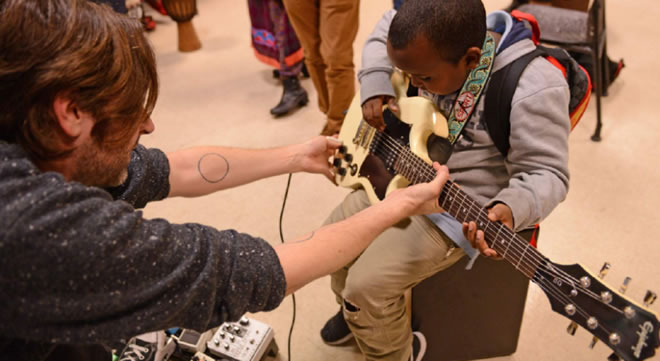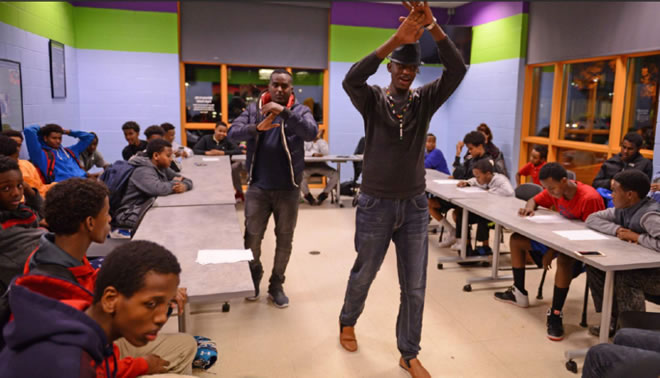The Bulletin
By Jenna Ross / Star Tribune (Minneapolis)
Saturday, October 29, 2016

Musician Jeremy Ylvisaker lets 8-year-old Samir Muse try his guitar. Mark Vancleave / Minneapolis Star Tribune
MINNEAPOLIS — In a classroom in the Cedar-Riverside neighborhood of Minneapolis, members of the Somali hip-hop group Waayaha Cusub started singing.
A few boys tumbled into the room, then grew quiet as the men harmonized in Somali, patting on drums. A 10-year-old named Hamze grabbed a djembe drum, balanced it atop his basketball and began playing along.
This hip-hop collective has held concerts in Nairobi’s most dangerous neighborhoods and even staged a massive music festival in Somalia’s war-torn capital, Mogadishu. In those cities, Waayaha Cusub risked bullets and bombs to perform for young people, using lyrics to steer the kids away from extremism and toward peace.
This month, the refugee rappers and singers have brought that message to Minnesota — where there’s far less risk but still great need, its members say.
“If you look at the youth who have joined Al-Shabab, Al-Qaida, ISIS, most of these youth are from the Western world,” said Shiine Akhyaar Ali, one of the group’s rappers and its manager, through a translator. “They’re seeing the wrong messages. And the reason we’re here is to send them the right messages.

Artist Dalmar Yare leads kids in a song his group will perform with workshop participants.
Mark Vancleave / Minneapolis Star Tribune
“Stay away from violence, from extremism, from drugs because Somalia’s waiting for you to lead.”
Led by the Cedar Cultural Center, the program, called Midnimo, is also putting the musicians in the classroom. They’ve improvised with students at Augsburg College and played with middle-schoolers at the Brian Coyle Community Center, teaching them their anthems and helping the students fashion their own songs.
Waayaha Cusub was formed in 2002 in Kenya, where its members had moved as children to escape Somalia’s conflict. Because they are now scattered across the globe — unable to return to Kenya — bringing the musicians here was tricky. So tricky, in fact, that one of its lead singers didn’t make it.
Falis Abdi Mohamud’s face is featured at the top of the band’s posters, bathed in light. In 2014, Mohamud, who is married to Ali, and the other performers gathered in Amsterdam, where they began recording a new album, “Nabad Waa Muhim” or “Peace Is Vital.” But on their way out of Nairobi, officials seized their refugee cards, Ali said, revoking their residencies. The couple’s three children — the youngest was 11/2 years old at the time — stayed in Kenya with relatives.
Mohamud was granted asylum in Amsterdam and worked to bring their children there. A month ago, she got word: They would be reunited.
But two of the children got sick and were hospitalized, and Mohamud couldn’t care for her three children, plus three family members’ kids, in a small apartment. So she and the children landed in a Rotterdam refugee camp.
As he told the story, Ali squeezed the space between his forehead and his temple. “I am in touch with her every day,” he said. “I can feel the pain that she’s going through.”
In a note on Facebook, Cedar executive director Adrienne Dorn wrote: “It’s hard to see this incredible group face such obstacles. But for many of the artists that we present as part of Midnimo, challenges like this continue to impact their lives and art form.”
On a recent Friday afternoon, Ali and two other performers — Lihle “Six Fingers” Muhdin and Dikriyo Abdi - rehearsed on the Cedar’s stage. Between songs, they spoke in rapid Somali and then, in halting English, traded notes with Minnesota musicians who are serving as their backing band.
“Do you like that groove?” asked drummer Joey Van Phillips, who plays with Dessa.
“Yeah, that’s good,” Abdi said, nodding.
In recent weeks, this group of musicians has gone to classrooms together, communicating with students in varied ways. In a class at Augsburg, students watched a short video about Waayaha Cusub before asking its members questions. Then they all played music together.
“They were having to speak through a translator, and yet when they started to improvise, everybody knew 4/4 time, everybody knew pentatonic scales,” said Jill Dawe, an associate professor of piano. The experience demonstrated something she often mentions: Music is a culturally specific and universal language, she said. “It broke the ice in the room, in a way.”
In class, conversations delved into musical specifics but also politics. After the band talked about using music and poetry to engage young people, Dawe asked her students if they’ve ever used music to solve a community problem.
Waayaha Cusub’s lyrics address AIDS, circumcision, women’s rights and love. But the group has became internationally known for tackling extremism.
Warlords, at first. Then, in a 2010 song, the musicians pointed to the terrorist group Al-Shabab, a growing presence in Eastleigh, their neighborhood in Nairobi. “Be aware — this is the enemy living within you, this is educating your kids and your youth about how extremism is the way,” Ali said via a translator.
“Shocked, shocked. Who is behind this trail of destruction? Al-Shabab,” Ali raps in Somali on “Yaabka al Shabaab,” or “The Terrible Al-Shabab.” “They galvanize people on the street for their wicked cause. They profess to be pious but wield machetes.”